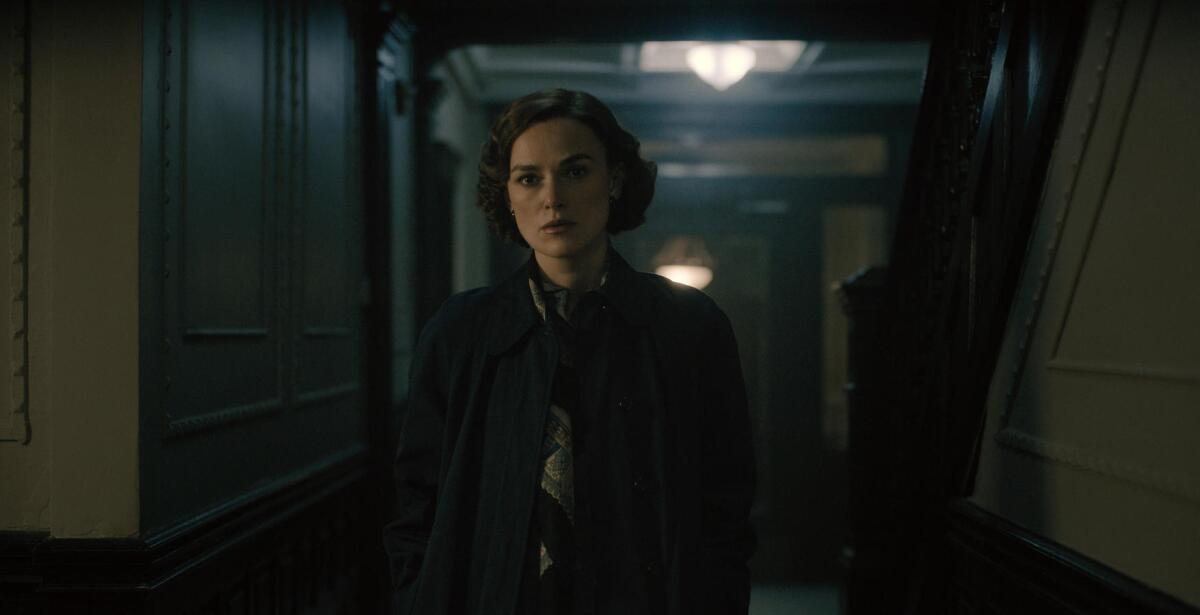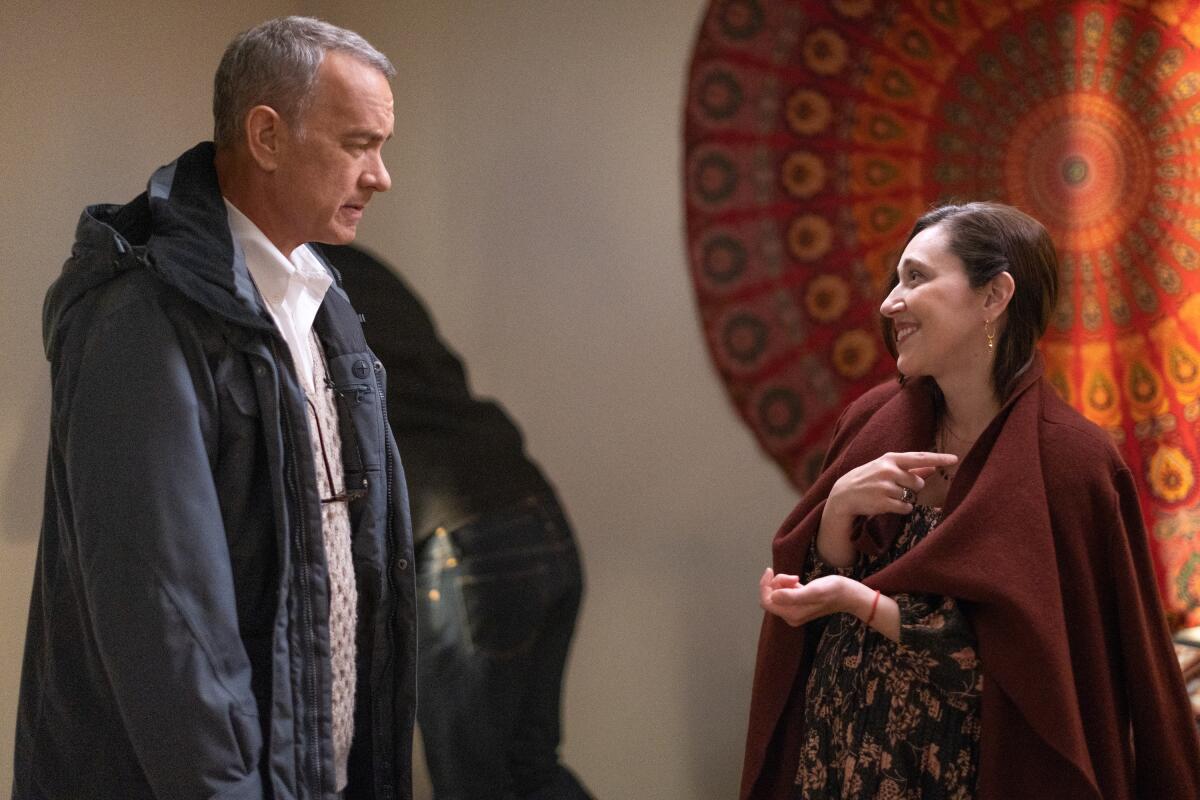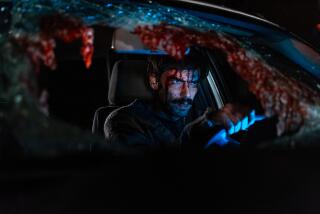Review: Keira Knightley pursues the ‘Boston Strangler’ in Hulu journalistic thriller

- Share via
‘Boston Strangler’
Like “Zodiac” and “Spotlight,” the moody true-crime drama “Boston Strangler” is a journalism story rooted in cultural history, looking back at how the customs of a particular time and place affected the way newspaper reporters covered a high-profile case. The investigation here involved one of the nation’s most infamous serial killers: a rapist and murderer who terrorized Boston in the early 1960s. Keira Knightley plays Loretta McLaughlin, the real-life reporter who — with the help of her police sources — found a pattern in the crimes.
“Boston Strangler” writer-director Matt Ruskin has two main takes on this story — one of which is more provocative than the other. The movie’s duller parts criticize the era’s sexism via a pat underdog arc, in which McLaughlin and her fellow reporter Jean Cole (Carrie Coon) overcome hostile cops, a skeptical editor (Chris Cooper) who thinks women should stick to the Lifestyle section and Loretta’s husband (Morgan Spector), who gets fed up with her chasing leads rather than taking care of the kids. “Boston Strangler” also suffers from an oppressively drab style, with a surfeit of dim lighting, muted colors and arty compositions.
Yet the film still mostly works, thanks to Ruskin’s other angle: interrogating how the meaning of this story changes over time. What seems at first like a triumph of investigative legwork — with the press and police working together to protect the public — becomes more complicated after Albert DeSalvo is named by the authorities as the Strangler. Because DeSalvo’s confession doesn’t quite add up, McLaughlin keeps digging, uncovering the possibility of multiple perpetrators. Her and Cole’s victory over chauvinism is certainly admirable. But the more powerful parts of this picture have to do with their realization that people may be too eager to hear tidy stories with clear villains and conclusions — even if they’re not entirely true.
‘Boston Strangler.’ R, for some violent content and language. 1 hour, 52 minutes. Available on Hulu

‘Money Shot: The Pornhub Story’
Too many documentary projects these days turn a feature film’s worth of content into a tedious multi-part series; but director Suzanne Hillinger’s 94-minute “Money Shot: The Pornhub Story” should really be longer, given how much ground it covers. Hillinger touches on the history of internet pornography, the ways free porn has both hurt and helped adult performers and the various campaigns to kill the website Pornhub. Her main focus is on the latter: the complicated back and forth between the sex workers trying to make a living and the activists determined to dismantle their platforms.
“Money Shot” gives that story its due. While Hillinger clearly seems more sympathetic to the models, she does let the opposition make its case cogently. The film acknowledges the real problem of crowd-sourced porn sites making money from scenes of nonconsensual sex (and then hesitating to remove them). The question “Money Shot” asks is whether this should prevent willing adults from selling pictures of their bodies online. This is a tricky topic, and Hillinger sometimes strays too far away from it, indulging in sexually explicit digressions that are more titillating than germane. For the most part, though, this is a thoughtful look at a controversy unlikely to fade away, so long as modern technology and prurient interests continue to exist.
‘Money Shot: The Pornhub Story.’ TV-MA, for child abuse references, language, nudity, sexual violence references and sex. 1 hour, 34 minutes. Available on Netflix
‘Pinball: The Man Who Saved the Game’
The docu-dramedy “Pinball: The Man Who Saved the Game” tells a low-stakes story with an accomplished cast, an appropriately light tone and enough energy to compensate for its slightness. Mike Faist follows his standout performance in Steven Spielberg’s “West Side Story” by bringing warmth and charm to the role of Roger Sharpe, the real-life journalist who wrote a comprehensive history of pinball machines in the 1970s — and who also used his expertise to help overturn New York City’s decades-old ban on the game.
Writer-director brothers Austin and Meredith Bragg keep circling back to the tale’s wow moment, when Sharpe demonstrates to government officials that pinball is a game of skill, not a game of chance. Dennis Boutsikaris plays the older Roger, who narrates his story and “corrects” the filmmakers when they try to make his life look more dramatic than it actually was. This doesn’t keep the Braggs from spending half their running time on Sharpe’s sweet but bland romance with a single mom (Crystal Reed). Still, anyone interested in gaming history will find a lot to enjoy here; and the general niceness helps make what is essentially a fun 15-minute anecdote tolerable for 90.
‘Pinball: The Man Who Saved the Game.’ Not rated. 1 hour, 34 minutes. Available on VOD
‘Supercell’
If you can forgive the persistent corniness of “Supercell,” this modestly budgeted storm-chaser drama offers some surprising surface pleasures. Director Herbert James Winterstern (who also co-wrote the script with Anna Elizabeth James) frames the picture handsomely, taking full advantage of the flat lands and big skies for his story about a restless teenager, William Brody (Daniel Diemer), who leaves home to join his Uncle Roy (Skeet Ulrich) in what remains of his late father’s thunderstorm/tornado research company. The movie may be a bargain-priced “Twister,” but it often looks impressive.
Winterstern makes good use of the two biggest names in his cast: the late Anne Heche, who gives one of her final screen performances as William’s mom, a brilliant scientist who gave up extreme meteorology when her husband was killed by weather; and Alec Baldwin, who plays the money-grubbing opportunist who bought the Brody family business and has turned it into a way to fleece thrill-seeking tourists. The dialogue is flatly functional and the story is stubbornly devoid of twists. But between the genuinely awe-inspiring storm effects and Corey Wallace’s rousing, old-fashioned score, “Supercell” feels like a cheaper but in some ways more heartfelt version of a ‘90s blockbuster.
‘Supercell.’ Rated PG-13 for language, some peril and smoking. 1 hour, 40 minutes. Available on VOD; also playing theatrically, Laemmle Glendale
‘Unwelcome’
Director Jon Wright has called his supernatural horror film “Unwelcome” a mix of “Gremlins” and “Straw Dogs” — a home-invasion thriller peppered with wee little beasties. And like both those movies, “Unwelcome” may push some viewers further than they’d like to go. Throughout the film, Wright and co-writer Mark Stay cruelly torment their heroes: a sweet young couple, Maya (Hannah John-Kamen) and Jamie (Douglas Booth), expecting their first baby. In the opening sequence, street punks break into their London apartment and push them around. Then when Maya and Jamie move to a rural Irish village for some peace, the family they hire to fix up their house (played by Colm Meaney, Jamie-Lee O’Donnell, Chris Walley and Kristian Nairn) prove to be intrusive and destructive.
The tension breaks a bit once the real stars of the picture arrive: a band of mischievous and malevolent fairies known as the Red Caps, who savvy villagers have been placating for generations with food and arcane rituals. There’s not a lot going on with the overall narrative arc of “Unwelcome,” which mostly has to do with Maya’s maternal instinct kicking in as she tries to figure out whether to ally herself with the jerky humans or the ferocious Red Caps to keep her unborn child safe. But Wright — a genre film veteran — generates effectively weird vibes with the creature effects and the at-times artificial-looking sets. The movie always looks fun, even when it’s shredding the nerves of its characters and audience.
‘Unwelcome.’ Rated R for strong violence and gore, pervasive language, some drug use and sexual material. 1 hour, 44 minutes. Available on VOD
Also on VOD
“The Magician’s Elephant” is an animated adaption of a Kate DiCamillo children’s novel, about an orphan (Noah Jupe) who has to complete a series of impossible tasks in order to find his long-lost sister. A stellar voice cast — including Mandy Patinkin, Aasif Mandvi, Natasia Demetriou, Brian Tyree Henry and Benedict Wong — adds color and variety to this fantastical tale, aimed at inspiring viewers to embrace hope. Available on Netflix; also playing theatrically, Bay Theater, Pacific Palisades
“Are You Lonesome Tonight?” is a Chinese neo-noir about a young air conditioning repairman (Eddie Peng) who gets involved in a hit-and-run accident and feels so guilty about it that he befriends his victim’s widow (Sylvia Chang) — only to find that the man he ran over was in deep trouble with some bad people. First-time feature filmmaker Wen Shipei gets too arty with this story at times, with his scrambled timeline and atmospheric scene-setting; but the picture looks beautiful, and at its best recalls the genre-bending, uniquely personal work of Wong Kar-wai. Available on VOD
Available now on DVD and Blu-ray

“A Man Called Otto” is a remake of a 2015 Swedish film (based on a Fredrik Backman novel) about a bitter crank whose outlook on life brightens a bit when he’s called upon to help his neighbors. Tom Hanks plays the title character in a funny and heartwarming performance that helped make the movie a surprise box-office hit. Sony
“The Whale” features Brendan Fraser’s Oscar-winning performance as a reclusive man whose self-loathing and unhealthy eating habits have pushed him to the brink of dying. Before he checks out permanently, he tries to make things right in the two most important relationships in his life: with his estranged daughter (Sadie Sink) and with his best friend Liz (Hong Chau, an Oscar nominee for this role). Lionsgate; also playing theatrically in limited release
More to Read
Only good movies
Get the Indie Focus newsletter, Mark Olsen's weekly guide to the world of cinema.
You may occasionally receive promotional content from the Los Angeles Times.










